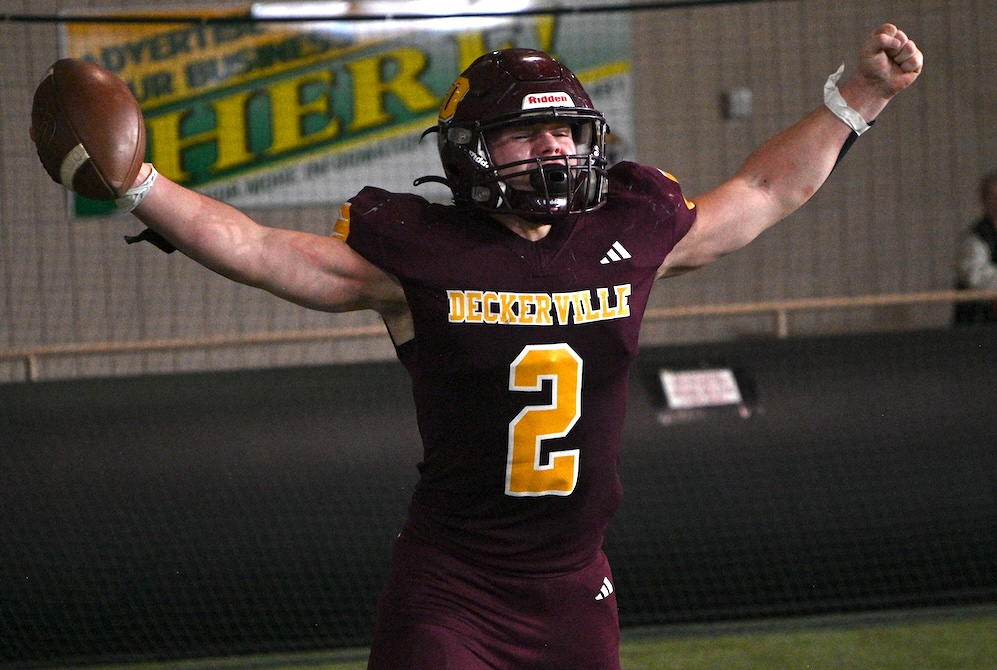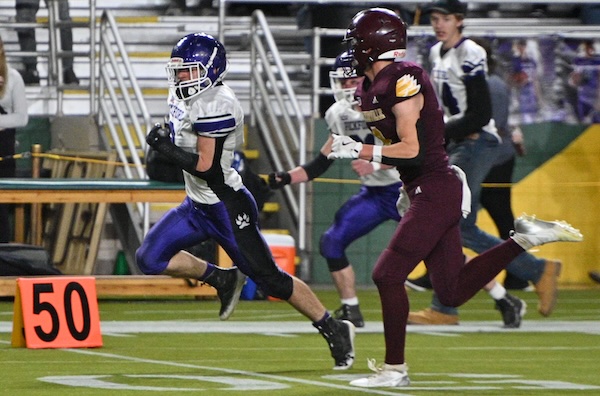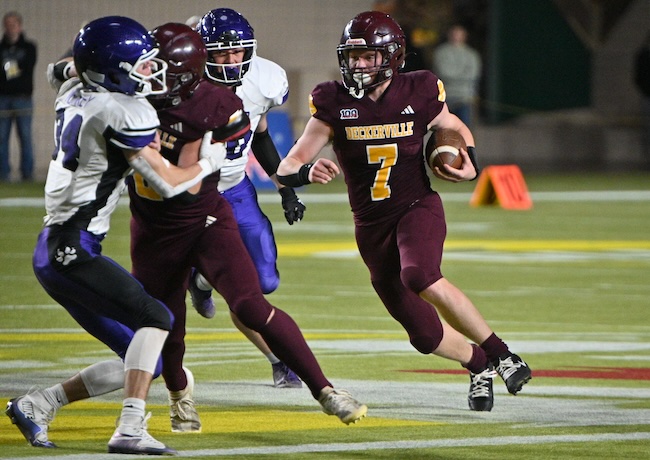
Writer-Turned-Coach Enjoys Debut
November 3, 2016
By Dennis Grall
Special for Second Half
ESCANABA — Sam Eggleston has seen high school football from two drastically different viewpoints. Now, even though he is an unpaid volunteer, he enjoys being on the sideline as a coach.
 Eggleston just completed his first season as a high school head coach, with Eben Superior Central winning its final three games to finish 4-5 in 8-player football. The Cougars were among the first teams in the state to join the 8-player format in 2010, their first year of football.
Eggleston just completed his first season as a high school head coach, with Eben Superior Central winning its final three games to finish 4-5 in 8-player football. The Cougars were among the first teams in the state to join the 8-player format in 2010, their first year of football.
Eggleston was a sportswriter before becoming a coach, giving him different perspectives to watching the same event.
The 1998 Rock Mid Peninsula High School graduate worked at newspapers in Escanaba, Kenai, Alaska; Northville and Novi, and Marquette before becoming a freelance writer and website blog editor in 2008. He started the writing phase of his career in 2000 with the Daily Press in Escanaba, under my direction.
He served as a volunteer assistant football coach in Northville, then moved back to the Upper Peninsula and became a volunteer coach at his alma mater in 2011 when the Wolverines went to 8-player football. He joined Superior Central in 2014 and spent two seasons as a volunteer aide until landing the head job just two weeks before the 2016 preseason began.
“In both careers … you took a shot on me and I ran with it, and the same with coaching; they gave me a shot and I’ve run with it as best I can,” he said.
In addition to his unpaid position at Superior Central, in rural Alger County, Eggleston is responsible for fundraising for the self-funded football program, a major priority for his offseason.
“My coaching is over (for the season) now and the majority of my time will be spent on raising funds so we can get new helmets, get new pads to replace ones that are broke, spending money we don’t have so we’ve got to make that up now,” he said. “We have to win now to have successful fundraisers.”
As a sportswriter, Eggleston would simply switch gears and move on to coverage of the next athletic season, for instance once fall sports moved into winter. He also never had to worry about how coaches managed off-field X’s and O’s once their seasons concluded.
Life was totally different as a reporter. “I had a different approach, different viewpoint, different mindset to a game as a writer,” said Eggleston, who still has the heft of when he was a lineman but now looks like a lumberjack with his bushy beard and build.
“Now I have to worry about every kid and every position,” he said. “Sometimes I don’t even see the end result of the play because I’m watching the line play. I don’t even know how well my running back did until I see where they moved the stick.”
He may also be working on an injured player while the game goes on, trying to make play calls and other decisions at the same time.
As a sportswriter, he would be jotting down notes between plays or perhaps checking the result of a picture he took of the previous snap, totally unaware the coach was monitoring several assignments.
“I look back at the writer I was and as a coach now, and I would hate the type of writer I was,” he said.
Eggleston would analyze why a coach would switch to running a sweep rather than the counter that had been working, all while the coach may be working on an injured player that caused a change in offensive plans.
“As a writer I never had the insight to see everything. I just saw the overall game and kept track of every yard,” he said. “As a coach I can’t even tell if the play went five yards because I have three plays stacked up as the game goes on.”
While he was writing sports in the metro Detroit area, his weekly paper often covered games also being covered by the Detroit Free Press or the Oakland Press, with those stories appearing the next day. Eggleston’s story would appear maybe five days later, after everyone knew what happened.
 “I had to come in with a different angle. I tried to be a little more analytical and focus on strategy versus the flourish and try to get the meat of the game rather than get to the flowery parts,” he recalled. “I tried to take a different approach and make my stuff more interesting.”
“I had to come in with a different angle. I tried to be a little more analytical and focus on strategy versus the flourish and try to get the meat of the game rather than get to the flowery parts,” he recalled. “I tried to take a different approach and make my stuff more interesting.”
His style apparently worked as the paper received several journalism awards and subscriptions remained strong.
Writing also provided some interesting backdrops. He had to use small charter planes to see some games in Alaska, or get to Nome to handle features about the Iditarod sled dog race.
He recalls covering a high school hockey game on an outdoor rink in Alaska and said “it was the first time I saw wind shear affect a hockey game.”
Eggleston also covered a football game where a kicker booted the ball off the uprights, then off a fence, and it bounced into the ocean in Homer.
He reported on a murder trial at that paper, where he would work the news desk in the morning, take time off and then handle sports at night. “It was super stressful,” he said.
Now walking the sidelines as a coach, he said “it definitely does feel like I’ve seen both sides of the coin, and I understand both sides of them better.”
He remembers just giving “little more rounded answers and (to) give both sides of the story” in postgame interviews. “A lot of coaches give canned answers. I try to be a little more in-depth and help try to write the story.”
In his early days as a sportswriter, he said “I would see the game unfold and see the pressures and why a coach would make a decision to go for it (on fourth down). I was a bit more critical of the coach and their decision,” he said, adding “I would probably have been a little more biting about it when I wrote the story.”
He admits in those days “I thought I knew everything there was to know about football. I played it,” he said. “I always approached the game like I was the professional and knew everything about the game. Now as a coach there are a host of responsibilities during every game. I am in completely different waters now. The hardest thing is keeping the kids pointed in the right direction as things go wrong.
“You’ve got the entire team and you’ve got to keep moving in a positive direction, keep the focus going forward. Forget the last play and work on the next one and get the kids to buy into that philosophy.”
He also compares his first writing assignment at the Daily Press with his first game this season at Ontonagon. “I did a (men’s baseball) story about the Escanaba Polecats, and you read my first line and said, ‘Did Yoda write this?’ I thought, oh my God, I don’t know what I’m doing.”
The Cougars lost their opener this fall 36-8, and Eggleston said “after being an assistant for four years, I still wasn’t prepared going into that Ontonagon game. We lost, and as I look back, if we played them right now I think we would beat them.
“I had no clue coming into that first game and didn’t have any idea how to get us back on track.”
He eventually figured enough out to finish 4-5 and found plenty of ways to enjoy being a coach.
Eggleston tries to eat lunch with his players every day, and he pays for his own meal.
“I want a family environment there; we all sit at the same table,” he said. “What I get back is relationships I never had before. I feel like I have 21 kids, and I love every minute of it.”
 Denny Grall retired in 2012 after 39 years at the Escanaba Daily Press and four at the Green Bay Press-Gazette, plus 15 months for WLST radio in Escanaba; he served as the Daily Press sports editor from 1970-80 and again from 1984-2012. Grall was inducted into the Upper Peninsula Sports Hall of Fame in 2002 and serves as its executive secretary. E-mail him at [email protected] with story ideas for the Upper Peninsula.
Denny Grall retired in 2012 after 39 years at the Escanaba Daily Press and four at the Green Bay Press-Gazette, plus 15 months for WLST radio in Escanaba; he served as the Daily Press sports editor from 1970-80 and again from 1984-2012. Grall was inducted into the Upper Peninsula Sports Hall of Fame in 2002 and serves as its executive secretary. E-mail him at [email protected] with story ideas for the Upper Peninsula.
PHOTOS: (Top) Eben Junction Superior Central football coach Sam Eggleston speaks with some of his players during a game this season. (Middle) Eggleston monitors the action on the field. (Photos by Dennis Grall.)

Deckerville Completes Title-Clinching Comeback with Unforgettable 'Drive'
By
Jason Juno
Special for MHSAA.com
November 23, 2024
MARQUETTE — Deckerville was used to being in a tough spot.
The Eagles were behind for the duration of the 8-player Division 1 championship game against Pickford on Saturday until finally taking a 30-28 lead eight seconds into the fourth quarter.
When they got the ball back after a brief Panthers possession, they still had that lead. They were just pinned at their own 1-yard line.
Coach Bill Brown had three thoughts.
The first was, “Oh, no.”
The second centered on getting out of there without surrendering a safety or turning the ball over near the end zone.
The third was “The Drive” from back in 1987 when quarterback John Elway took the Denver Broncos 98 yards in the late stages of the fourth quarter to tie the AFC Championship game, which they eventually won.
“I was like, ‘Hmm, I wonder if we can have the drive and we can call that The Drive,’” Brown said.
 Saturday’s drive will certainly be remembered in Deckerville for a long time. The Eagles didn’t score, but they did run out the clock – all nine minutes, 14 seconds of it.
Saturday’s drive will certainly be remembered in Deckerville for a long time. The Eagles didn’t score, but they did run out the clock – all nine minutes, 14 seconds of it.
That cemented their 30-28 championship victory at the Superior Dome. After falling behind by two touchdowns early, the Eagles rallied back by holding onto the football and keeping Pickford’s electric quarterback, Tommy Storey, on the sideline.
“It’s a dream come true,” Deckerville senior linebacker Corbin Sharbowski said. “I’ve been dreaming since I was a little kid. I think in seventh grade, we were all on the same team, we had a pretty good season and we were like, ‘Yeah, we might be able to do this.’”
Saturday’s game started out as a nightmare, in part thanks to an epic performance by Storey.
The 5-foot-9, 175-pound senior ran for touchdowns of 44, 70, 57 and 34 yards in the first half to give the Panthers 16-0 and 28-16 leads. He ended the half with 282 rushing yards, just 70 off the record for a full 8-player championship game.
He only recorded 22 yards during the second half. To be fair, he was rarely on the field after halftime.
Deckerville got the ball first in the second half. The Eagles used 15 plays to go 71 yards while taking more than 7½ minutes off of the clock.
They converted two fourth downs, including a 4th-and-9 when standout quarterback, Hunter Garza, ran 17 yards for a first down at the 1. Parker Merriman ran the last yard to pull Deckerville within five of Pickford’s lead, 28-23.
The Panthers followed with a four-and-out, as the Eagles stopped their 4th-and-3 play for no gain.
Deckerville took its first lead on the ensuing possession, with Brandon Salowitz grabbing a 36-yard touchdown pass from Garza. Mark Donker’s extra point kick made it 30-28 Eagles with 11:52 left in the game.
Brown said that was the first time they ran that play all season, and it was likely the only one Pickford hadn’t seen from them during pregame prep.
“I (had) seen Brandon, I knew he was 1-on-1, so I just threw it up and he did the rest,” Garza said.
 Storey ran for 12 yards on the first play of Pickford’s next possession. A false start doomed that drive, though, and Pickford took two timeouts before deciding to punt from its own 49 with 9:25 left.
Storey ran for 12 yards on the first play of Pickford’s next possession. A false start doomed that drive, though, and Pickford took two timeouts before deciding to punt from its own 49 with 9:25 left.
The Panthers executed the punt well, downing the ball at the 1-yard line.
They just never saw the ball again. Seventeen rushing plays by Garza and Merriman – only one of which went for more than 10 yards, an 11-yard gain by Garza – ate up all of that clock. Deckerville converted on three third downs. Garza rushed five yards on 4th-and-5 at the Pickford 30 to seal it.
“There wasn’t, ‘Hey, let’s keep the ball,’” Brown said. “No, it’s let’s go score because we’re going to have to outscore them sooner or later.”
Pickford ran just nine offensive plays during the final two quarters. Deckerville went 5-for-5 on fourth downs and had the ball for 19 minutes, 3 seconds of the 24-minute second half.
“That’s the game we like to play,” Pickford coach Josh Rader said. “We like to keep their offense off the field. They did that to us. They ground and pounded it. They got first downs when they needed to.”
Eagles also defended the physical runner Storey well the few times he touched the ball in the second half. “I thought we could run at him a little more, maybe wear him down a little bit more running at him,” Brown said.
Storey finished with the second-most rushing yards 8-Player Finals history, 304 on 21 carries with the four first-half touchdowns. Pickford ended the season at 12-1.
“Proud of our guys,” Rader said. “Like I mentioned after the game, it hurts right now. As we get time to get away, they’re going to realize how fun it actually was to be in this game.”
Deckerville, meanwhile, finished a perfect 13-0.
“It’s so surreal I can’t even grasp what’s happening right now,” Brown said.
The title was Deckerville’s second in 8-player and first since 2012.
“It’s a crazy experience to even go to the state finals,” said Garza, who finished with 225 yards on 37 carries with two touchdowns, “but to win it is just awesome.”
PHOTOS (Top) Deckerville's Brandon Salowitz celebrates his second-half touchdown reception Saturday at the Superior Dome. (Middle) Pickford quarterback Tommy Storey (8) breaks away for his second touchdown run of the first half. (Below) Deckerville quarterback Hunter Garza (7) begins to cut back during his first-half touchdown sprint. (Photos by Cara Kamps. Click for more.)

